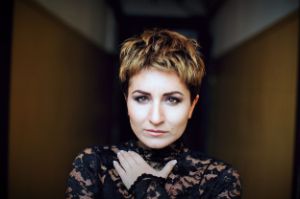Guest Performance / Opera
Semiramide (semi-staged)
Melodramma tragico in two acts
by Gioacchino Rossini (1792 – 1868)
Libretto: Gaetano Rossi based on Voltaire’s “Le Tragédie de Sémiramis”
World premiere: 3 February 1823 in Venice

Salome Jicia © Maia
Rossini is unjustly reduced to his –indisputable- talent as composer of opera buffa works. His opera seria have always taken a back seat, well behind the “Barbiere di Siviglia”. His successful work ranges from “Il Cambiale di Matrimonio” (Venice, 1810), his first opera, to his last opera, “Guillaume Tell” (Paris 1829). They demonstrate a highly versatile development over twenty years with various genres, – from the “farsa” to the opera buffa, from the opera seria to the grande opéra.
Verdi praised Rossini’s supple use of melody, his brilliant usage of cantabile in the vocal parts and his characteristic orchestral accompaniment; all these stand for a typically Italian sound culture on the opera stage. In 1823 Rossini marked the culmination point of the great Italian song opera with SEMIRAMIDE. With the interpretation of works by Wagner and Verdi the future was to hold completely novel developments in the vocal parts. The opera seria libretto varies from the opera buffa libretto in that it has typically a tragedy with characters from history and mythology as subject matter. The archetypes are presented in prescribed situations; the hero, the heroine, the scoundrel, the helpers are accordingly typified, which also reflects on the proportion and setup of their parts. However, at the centre of their impact on the stage, you will find artistic coloraturas and culinary embellishments that take precedence over the psychological and dramaturgical development. The primadonna with her unique blend of virtuosity and caprice was the benchmark for composers, theatre directors and audiences in the era of belcanto.
Rossini defined himself as the “Last of the Classicists”. For “Semiramide”, his masterpiece, he chose an archaic story, ideal for an “opera monumentale”. The legendary Queen of Assyria as leading character is caught up in complicated intrigues and family rivalries. There are the calls of blood, the divine oracle and of human conflicts to be weighed and considered. We are offered regicide, unintentional incest and accidental matricide, all in aid of the composer’s need to enrich theatrical situations with profound madness scenes, highly ornamental oaths of love, intense revenge arias and brilliantly impressive choir scenes. According to Rodolfo Celetti in his history of belcanto, “Semiramide” is “the last opera in the great baroque tradition, the most beautiful, fantasy-filled, and quite possibly, the most perfect; but also – irretrievably so – the final one.”
Artistic Team
Orchester der Deutschen Oper Berlin
Corrado Rovaris – Conductor
Chor der Deutschen Oper Berlin
Jeremy Bines – Chorus Dirctor
Philine Tiezel – Scenic Arrangement
Salome Jicia – Semiramide
Beth Taylor – Arsace
Riccardo Fassi – Assur
Levy Sekgapane – Idreno
Maria Motolygina – Azema
Bogdan Talos – Oroe
Jörg Schörner – Mitrane
Padraic Rowan – King Nino’s Spirit
Guest performance of the Deutsche Oper Berlin